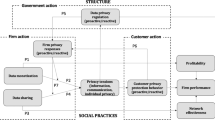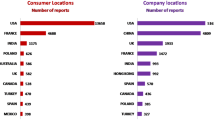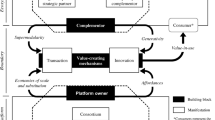Abstract
The E-Commerce Directive laid the foundation of the EU legal framework for digital services. Since its adoption in 2000, the legal framework has remained largely unchanged, while the digital economy has undergone a profound transformation. The digital economy is today becoming a platform economy. Rules and legal solutions underpinning the Directive effectively accommodate the structural, operational, and behavioural features of a preliminary stage to the platform economy. Thus, the cornerstone of the EU digital services legal framework now requires a thorough revision. Despite its merits, noticeable limitations on facing new challenges surface. The aim of this Paper is to highlight those legal issues that call for attention in the Digital Services Act package.
Similar content being viewed by others
Notes
EPRS – European Parliamentary Research Service, Digital Services Act. European added value assessment, October. 2020.
Beyond the concept of globality or universality, intended to describe the expansion of international trade and the nature of cross-border transactions, the author advocates the coining of a new concept that better reflects the genuine nature of digital activities: the “digitality”. Rodríguez de las Heras Ballell [5].
Hence, a global harmonized legal approach to platforms would be highly advisable and desirable, as I advocated in Rodríguez de las Heras Ballell [6].
Schwarcz [9].
In Rodríguez de las Heras Ballell [7], I coined the term “platform shopping”, a new variant of regulatory arbitrage, “to describe the intentional search for those platforms that offer a more favourable climate or a friendlier regulation for a specific activity. In a non-harmonised regulatory environment, platforms compete with each other as private-ordering-based systems to attract users to join their community and operate in their “private jurisdiction”. Thus, in the absence of harmonised rules on platforms, regulatory competition would enable actors in the digital market to deploy strategic actions and look for the most convenient platform. Although such efforts could be a natural response on the part of private actors to healthy competition among platforms, “platform shopping” rather describes the risks of a lack of harmonised legal framework, setting out the duties, obligations and liabilities of platform operators, leading to a proliferation of illegal content, hate speech, fake news, unlawful activities within platforms subjected to less stringent applicable laws and exploiting the non-harmonised legal background” (p. 62).
Gaps and ambiguities of the ECD provisions were progressively addressed and smoothed over by case law since the Directive’s adoption and implementation in domestic legal systems. The EU Study on the Legal Analysis of a Single Market for the Information Society. New rules for a new age?, prepared by DLA Piper and commissioned by the European Commission’s Information Society and Media Directorate-General, November 2009, relates the evolution of case law addressing some of these legal issues and ambiguities after less than a decade of the ECD being in force.
Feliu Rey [3].
As the EU Expert Group on Liability and New Technologies has assessed in the Report on Liability for Artificial Intelligence and other emerging digital technologies, European Union (2019), at https://ec.europa.eu/transparency/regexpert/index.cfm?do=groupDetail.groupMeetingDoc&docid=36608.
Directive (EU) 2019/790 of the European Parliament and of the Council of 17 April 2019 on copyright and related rights in the Digital Single Market and amending Directives 96/9/EC and 2001/29/EC (Text with EEA relevance) [2019] OJ L 130/92.
Directive (EU) 2018/1808 of the European Parliament and of the Council of 14 November 2018 amending Directive 2010/13/EU on the coordination of certain provisions laid down by law, regulation or administrative action in Member States concerning the provision of audiovisual media services (Audiovisual Media Services Directive) in view of changing market realities [2018] OJ L 303/69.
“Without prejudice to Arts 12 to 15 of Directive 2000/31/EC, Member States shall ensure that video-sharing platform providers under their jurisdiction take appropriate measures to protect (…)”.
“The video-sharing platform providers covered by Directive 2010/13/EU provide information society services within the meaning of Directive 2000/31/EC of the European Parliament and of the Council”.
“When providing services covered by Arts 12 to 14 of Directive 2000/31/EC, those requirements should also apply without prejudice to Art. 15 of that Directive, which precludes general obligations to monitor such information and to actively seek facts or circumstances indicating illegal activity from being imposed on those providers, without however concerning monitoring obligations in specific cases and, in particular, without affecting orders by national authorities in accordance with national law”.
“When online content-sharing service providers are liable for acts of communication to the public or making available to the public under the conditions laid down in this Directive, Art. 14(1) of Directive 2000/31/EC should not apply to the liability arising from the provision of this Directive on the use of protected content by online content-sharing service providers. That should not affect the application of Art. 14(1) of Directive 2000/31/EC to such service providers for purposes falling outside the scope of this Directive”.
The complexity behind the compatibility of Art. 17 Copyright Directive and the prohibition of general monitoring obligation as per Art. 15 ECD is wisely brought to light by Spindler [10].
Frosio [4].
Regulation (EU) 2019/1150 of the European Parliament and of the Council of 20 June 2019 on promoting fairness and transparency for business users of online intermediation services (Text with EEA relevance) [2019] OJ L 186/57.
Proposal for a Regulation of the European Parliament and of the Council on a Single Market For Digital Services (Digital Services Act) and amending Directive 2000/31/EC, COM (2020) 825 final. Proposal for a Regulation of the European Parliament and of the Council on contestable and fair markets in the digital sector (Digital Markets Act), COM (2020) 842 final.
See text of this article infra at Sect. 2.1.
See text of this article infra at Sect. 2.2.
See text of this article infra at Sect. 2.3.
Busch, C., Dannemann, G., Schulte-Nölke, H., Wiewiórowska-Domagalska, A., Zoll, F. [1].
De Francheschi [2].
Rodríguez de las Heras Ballell & Feliu Rey [8], pp. 91–114.
According to the Tackling Illegal Content Communication, par. 3.3.1.:
“The Commission considers that taking of such voluntary, proactive measures does not automatically lead to the online platform losing the benefit of the liability exemption provided for in Article 14 of the E-Commerce Directive.”
As reiterated by the Commission Recommendation of 1.3.2018 on measures to effectively tackle illegal content online, C (2018) 1177 final (26).
References
Busch, C., Dannemann, G., Schulte-Nölke, H., Wiewiórowska-Domagalska, A., Zoll, F.: An introduction to the ELI model rules on online platforms 9/2 EuCML. J. Eur. Consum. Mark. Law, 61–70 (2020)
De Francheschi, A.: Uber Spain and the “Identity Crisis” of online platforms, 1 EuCML. J. Eur. Consum. Mark. Law, 1–4 (2018)
Feliu Rey, J.: Smart Contract: concepto, ecosistema y principales cuestiones de Derecho privado 47 La Ley Mercantil, 1–27 (2018)
Frosio, G.F.: From horizontal to vertical: an intermediary liability earthquake in Europe. J. Intellect. Prop. Law Pract., 565–575 (2016)
Rodríguez de las Heras Ballell, T.: The emergence of digital communities: generating trust, managing conflicts, and regulating globality… digitality. In: Greenhouse, C.J., Davis, C.L. (eds.) Landscapes of Law: Practicing Sovereignty in Transnational Terrain. University of Pennsylvania Press, Pennsylvania (2020)
Rodríguez de las Heras Ballell, T.: Rules for electronic platforms: the role of platforms and intermediaries in digital economy. A case for harmonization. In: Proceedings of the UNCITRAL Congress Modernizing International Trade Law to Support Innovation and Sustainable Development to Celebrate the 50th Annual Session of UNCITRAL, United Nations, Vienna, 4–6 July 2017 (2017)
Rodríguez de las Heras Ballell, T.: Rules for a platform economy: a case for harmonization to counter “platform shopping” in the digital economy. In: Pretelli, I. (ed.) Conflict of Laws in the Maze of Digital Platforms – Le droit international privé dans le labyrinthe des plateformes digitales – Actes de la 30e Journée de droit international privé du 28 juin 2018 à Lausanne. Shulthess, Zurich (2018)
Rodríguez de las Heras Ballell, T., Feliu Rey, J.: Digital intermediary liability or greater responsibility: a remedy for fake news? In: Weaver, R.L., et al. (eds.) Twenty-First Century Remedies. Carolina Academic Press, North Carolina (2019)
Schwarcz, S.L.: Private Ordering 97 Nw. U. L. Rev. – Northwestern University Law Review, 319–350 (2002)
Spindler, G.: The liability system of Art. 17 DSMD and national implementation. Contravening prohibition of general monitoring duties? JIPITEC. J. Intellect. Prop. Inf. Technol. E-Commer. Law, 344–374 (2019)
Author information
Authors and Affiliations
Corresponding author
Additional information
Publisher’s Note
Springer Nature remains neutral with regard to jurisdictional claims in published maps and institutional affiliations.
Rights and permissions
About this article
Cite this article
Rodríguez de las Heras Ballell, T. The background of the Digital Services Act: looking towards a platform economy. ERA Forum 22, 75–86 (2021). https://doi.org/10.1007/s12027-021-00654-w
Accepted:
Published:
Issue Date:
DOI: https://doi.org/10.1007/s12027-021-00654-w




